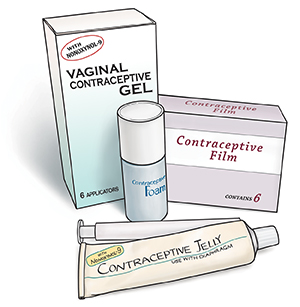Spermicides help prevent pregnancy by killing sperm before they can enter the uterus. They come in many forms, including foam, jelly, film, and suppository-like inserts. These can be bought in drugstores without a prescription.
Pregnancy rates
Talk to your healthcare provider about the effectiveness of this birth control method.
Using spermicides
-
For best protection against pregnancy, use spermicides with a barrier method (condom, diaphragm, or cervical cap).
-
Apply before there is any contact between the penis and vagina.
-
Check the package for instructions on how to apply.
-
Reapply each time you have sex.
-
Don't douche or use tampons for 6 to 8 hours after using a spermicide.
Pros
-
Easy to get
-
No prescription needed
-
Either partner can apply them, so responsibility can be shared
-
Come in many forms
-
Easy to stop if you decide you want to become pregnant
Cons
-
High pregnancy rate when used alone
-
Provides little protection against sexually transmitted infections (STIs)
-
Can interrupt sex
-
May cause minor irritation of the skin or vagina
-
May taste bad
Spermicides may not be for you
Spermicides may not be for you if:
-
You are not also using a barrier method
-
You are allergic to spermicides
-
You're not willing to interrupt lovemaking to apply them
Featured in


